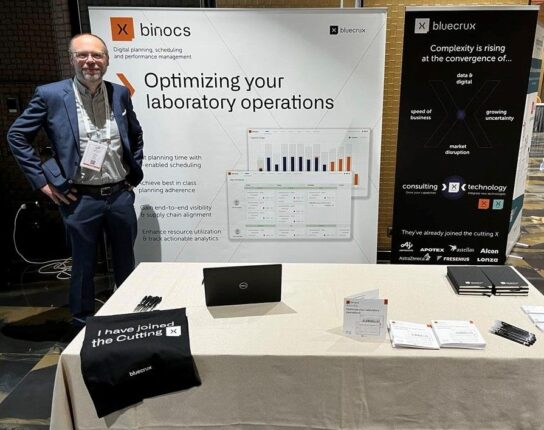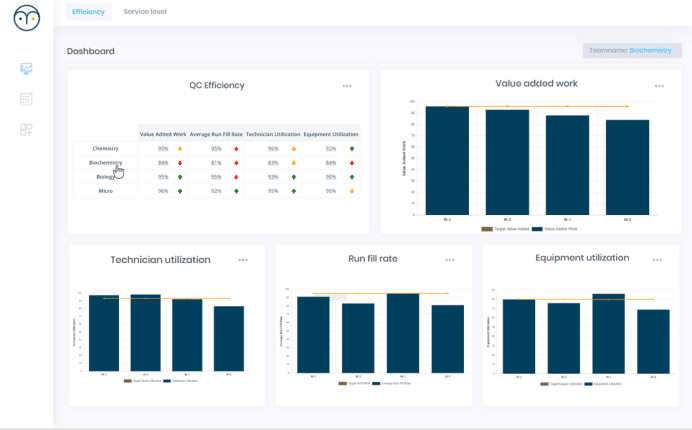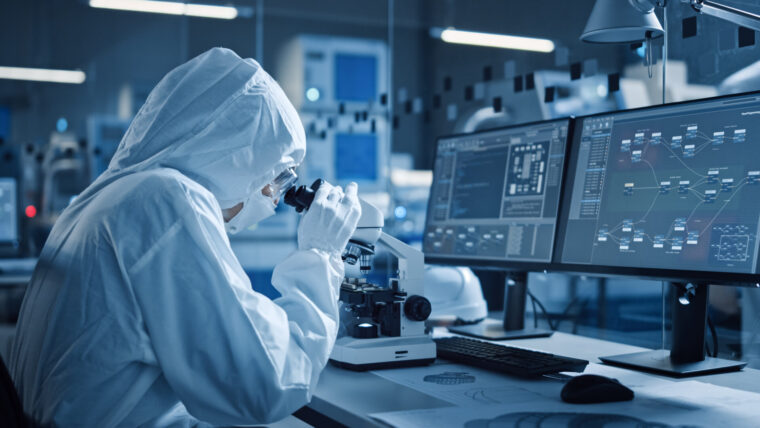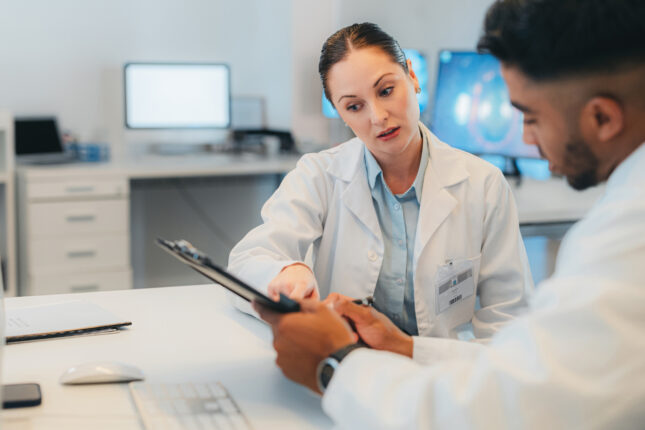
Key take aways Lab of the Future USA 2022
On March 22nd and 23rd, my colleague, Akshay Peer, and I attended the “Lab of the Future 2022” congress, held in Boston, MA. We were representing Binocs as one of 15 exhibitors who spanned lab technology companies, consulting groups, lab designers, and sustainable lab vendors. There were approximately 300 in-person and virtual attendees from across the industry, including many existing Binocs clients.
During the twentieth century and into the twenty-first, advances in laboratory science were slow and steady, with technological improvements mostly defined by iterative process refinements and the occasional leap forward in hardware development. The last decade has, however, witnessed a dramatic shift as the pharma world has increasingly embraced the emerging digital solutions that define the Industry 4.0 landscape. For this reason, it is now more important than ever for industry leaders to meet for discussions on the future of laboratories and to review the innovations that will shape the next leap forward.
That’s why Binocs was so pleased to be an exhibitor at the 2022 “Lab of the Future USA” congress, which featured discussions on an array of topics, including digitization and data analytics; lab automation and sustainability; and connectivity, communication and standards. An overview of the agenda of exciting case presentations and panel discussions from the 2-day event can be found here.
As we move towards the lab of the future, priorities are driven more than ever by the need to accommodate ever-increasing sample volumes, the rapidly developing complexity of processes and methods, and constantly changing regulations, all while focusing on efficiency and safety. It is therefore imperative to establish an environment that is tailored to user needs and which allows lab workers to concentrate on their specialisms rather than tasks that can be readily automated. Through the strategic implementation of new systems, it should be possible to increase the quality of results while enhancing the workplace, and also collecting, organizing and automatically evaluating the critical data that is generated.
The move towards electronic lab solutions (such as LIMS, ELN, etc.) has already led to the automated generation of increasingly vast quantities of data. Centralized data processing and analysis to generate meaningful insights has become vital in building a sustainable model for labs and introducing Lean principles and process automation promise to make significant contributions towards future goals, not only in our laboratories. Driven by increasing sample volumes, complexity of many processes, constant change in regulations, efficient and safe work in the laboratory is becoming ever more important. It is imperative to establish an environment that is tailored to the users’ needs and increase the quality of the results, combined with the possibility of collecting, organizing and automatically evaluating larger amounts of data. In the intelligent laboratory of the future, AI (artificial intelligence) and ML (machine learning) technologies will combine with interconnected analyzers, measuring devices and sensors to facilitate such centralization.
Effective system interoperability and data harmonization, however, will require agreement between vendors on standards that will enable data cleansing and aggregation across different sources. One potential approach is that being spearheaded by the Allotrope Foundation, which you can learn more about here.
Some companies are further along the path toward the lab of the future and it was amazing to see the amount of work being done to future-proof laboratories, as demonstrated through initiatives established by different presenters. For instance, Beam Therapeutics Director of Lab Automation, Bob Gantzer, provided a fascinating insight into their fully automated R&D lab; their use of robotics to manage the samples and processes was brilliant and received great feedback from all attendees. Meanwhile, Director of R&D IT and Bristol Myers Squibb, Vijay Nair, showcased their “IT Digital Greenhouse”, a connected innovation lab that forges communication between business users and IT. It was amazing to see the amount of work being done in future-proofing the laboratories and some of the initiative established by different presenters.
As a world leader in providing digital scheduling and capacity planning solutions for laboratories, the Binocs exhibit was also very well-received. Because we have already digitalized processes for more than 1,000 teams across the globe, we know many of the challenges being faced by labs on their journey towards greater lab digitalization and automation, including issues around interoperability (having previously integrated a number of third-party software systems). We received particular praise for our intelligent scheduling algorithm, our out-of-the-box zero-code interfacing solution, and the Binocs digital twin.
We spoke at length to various consulting groups, LIMS/ELN vendors, and equipment manufacturers to establish partnerships that can benefit our clients and wider ecosystem. It was also a pleasant surprise to meet some of our existing clients face-to-face as attendees! We are dedicated to being a key player in supporting the vision for the future and already introducing new technologies including AI/ML alongside our algorithm. We look forward to participating in more events like the Lab of the Future USA Congress and exploring possibilities for collaboration in exciting new advancements in the industry.
If you are interested in discussing a demo of the Binocs system for your lab, get in touch with us today!
Related content
-
Frederik Jaenen, Binocs VP of Sales, provides highlights from his workshop about digital implementation at the 2023 Paperless Lab Academy in Lake MaggioreRead more
-
Boston Consulting Group and Binocs join forces to create the “lab of the future”
In the coming months, Boston Consulting Group will be guiding laboratory representatives from all over the world through a “lab of the future” demo setup in the National Institute…Read more -
Towards a paperless future: the path to lab automation
Going “paperless” is about more than simply converting paper-based processes into digital counterparts. In this blog post, we will explore the critical steps towards achieving a paperless future for…Read more
Swapna Patel
Swapna has over 15 years of sales and business development experience in the healthcare and pharmaceutical industries. Working across the spectrum—from small start-ups to large companies—and serving customers on a global scale, she brings a wealth of expertise to her role as a Senior Account Manager for Binocs. With her unique combination of skills and education (including a Master’s degree in Professional Counseling), Swapna infuses her work with a blend of knowledge, enthusiasm, and a distinctive personal touch. In her spare time, she is a fine art enthusiast and plays the violin, viola, and cello.






